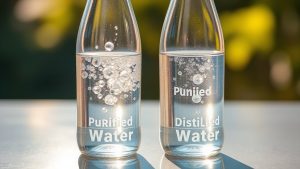
Filtered water and distilled water aren't the same; they differ in purification methods. Distilled water is created by boiling and condensing steam, removing almost all contaminants, including minerals. This makes it pure but devoid of beneficial minerals like calcium. Filtered water uses physical or chemical filters to remove impurities while retaining essential minerals, making it better for everyday hydration. Understanding these differences is vital for choosing the right option for your needs, and more insights await you.
When it comes to choosing between filtered water and distilled water, which option best suits your needs? Understanding the differences in purification processes, applications, mineral content, health implications, and environmental impact can help you make an informed decision.
Distilled water undergoes a rigorous purification process that involves boiling water into steam and then condensing it back into liquid form. This method effectively removes nearly all contaminants, including bacteria and heavy metals. On the other hand, filtered water employs physical or chemical filters to trap impurities, enhancing both taste and safety.
While filtration systems can vary widely in effectiveness, they may not eliminate all impurities, particularly if not properly maintained. Consequently, if your primary concern is the absolute removal of contaminants, distilled water might seem like the better choice.
Filtration systems may leave some impurities behind, making distilled water a preferable choice for those prioritizing complete contaminant removal.
In terms of applications, distilled water finds its place in laboratory experiments, medical procedures, and industrial processes. Its purity makes it ideal for appliances, as it prevents mineral buildup that could impair function. Conversely, filtered water is generally more suited for everyday use, such as drinking, cooking, and bathing.
It retains beneficial minerals like calcium and magnesium, essential for your health. If you're looking for a reliable source of hydration that contributes to your overall well-being, filtered water could be the way to go.
When considering mineral content, distilled water lacks nearly all minerals and electrolytes due to its purification process. This absence can impact your dental health, as fluoride is also removed. In contrast, filtered water retains the natural minerals present in the source, making it a healthier option for long-term consumption.
If you're concerned about maintaining essential nutrients in your diet, filtered water will likely meet your needs better.
Health considerations also play a significant role in your choice. Distilled water is beneficial for those with weakened immune systems, given its purity. However, for the average person, filtered water may be preferable due to its retention of essential minerals.
Long-term consumption of distilled water might require you to compensate for lost minerals through your diet, which could complicate your nutritional balance. In contrast, filtered water is generally deemed safe and effective for daily hydration.
Lastly, think about the environmental impact of each option. Both distilled and filtered water can reduce plastic bottle waste when utilized with home systems. However, producing and transporting bottled distilled water can have a higher environmental cost compared to using a filtered system at home.
Additionally, distillation is energy-intensive, while filtration systems tend to be more energy-efficient and have a lower environmental footprint.
Ultimately, the decision between filtered and distilled water hinges on your specific needs. Whether you're prioritizing purity, mineral content, health, or environmental considerations, understanding these factors will empower you to choose the option that aligns with your lifestyle and well-being.
Conclusion
In conclusion, while both filtered and distilled water undergo purification, they're not the same. Filtered water retains some minerals, enhancing taste, while distilled water is devoid of all impurities and minerals. For instance, if you're an athlete, you might prefer filtered water for its taste and minerals, while someone needing pure water for medical equipment might opt for distilled. Understanding your needs helps you choose the right option, ensuring you stay hydrated and healthy.



